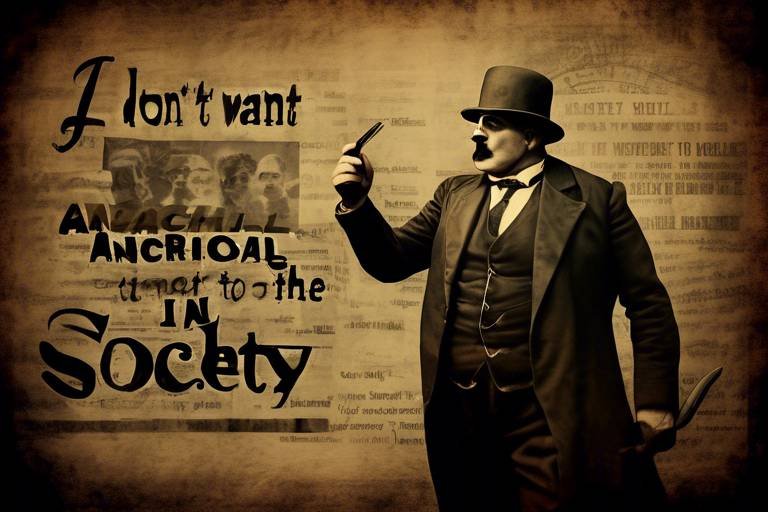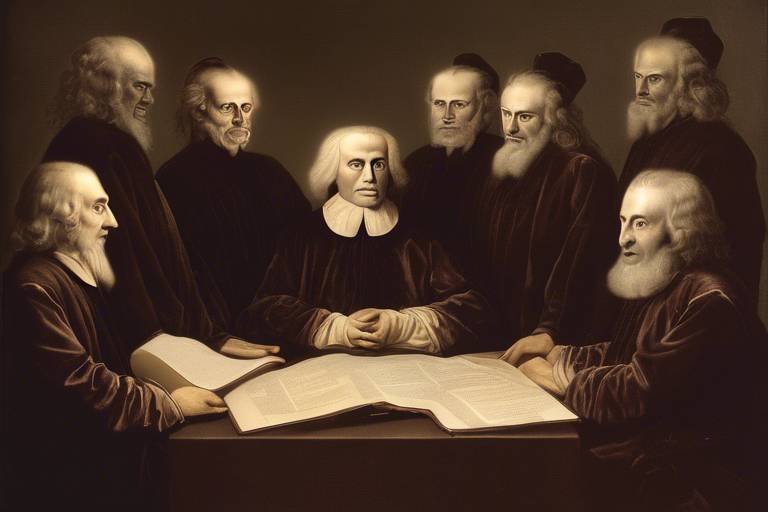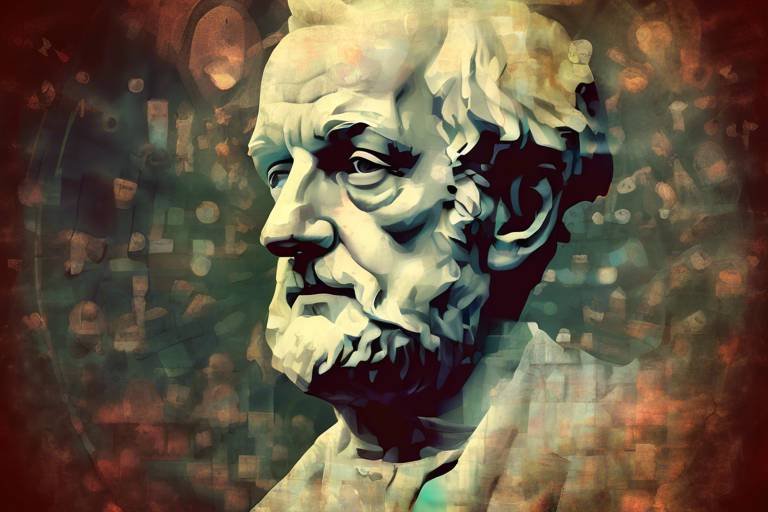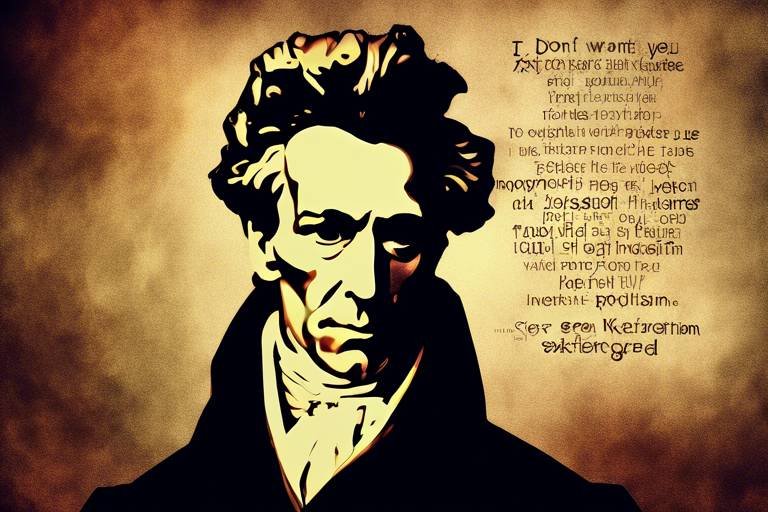Simone de Beauvoir and Her Philosophy of Existential Feminism
Simone de Beauvoir, a name that resonates deeply within the realms of philosophy and feminist thought, is often regarded as a pioneering figure in existential feminism. Her work has not only shaped the landscape of feminist theory but also challenged the very foundations of how we understand identity, freedom, and the human experience. By intertwining existentialism with feminist ideology, de Beauvoir opened new pathways for understanding women's oppression and liberation. But what exactly does this mean? How did her ideas revolutionize the way we think about gender and existence? In this article, we will delve into the core concepts of de Beauvoir's philosophy, exploring her profound insights and their lasting impact on contemporary feminist discourse.
At the heart of de Beauvoir's philosophy is the idea that "one is not born, but rather becomes a woman." This statement encapsulates her belief that gender is not a natural state but a social construct shaped by cultural norms and expectations. By emphasizing the role of societal influences, de Beauvoir encourages us to question our assumptions about gender roles and the limitations they impose on individuals. This perspective invites readers to reflect on their own experiences and consider how societal expectations have shaped their identities. Isn't it fascinating to think about how much of who we are is influenced by forces outside of our control?
De Beauvoir's insights extend beyond the individual, as she critiques the societal structures that perpetuate oppression. Her concept of the "Other" is crucial in understanding how women have been historically defined in relation to men. In her view, women have often been relegated to the status of the "Other," a position that denies them agency and autonomy. This framework not only highlights the inequalities inherent in gender relations but also serves as a call to action for women to reclaim their identities and assert their existence as individuals, rather than as mere reflections of men. Through this lens, de Beauvoir's philosophy becomes a powerful tool for feminist activism, urging women to break free from the constraints of societal expectations.
Moreover, de Beauvoir's work is not limited to discussions of gender alone; it also intersects with issues of race, class, and identity. By recognizing the complexities of these intersections, we can better understand the diverse experiences of women. De Beauvoir's philosophy encourages us to adopt an intersectional approach, acknowledging that the struggles faced by women are not monolithic but rather shaped by a multitude of factors. This perspective is particularly relevant today, as contemporary feminist movements strive to be more inclusive and representative of all women's voices.
In essence, Simone de Beauvoir's contributions to existential feminism invite us to engage in a deeper exploration of our identities and the societal structures that define them. Her work challenges us to embrace our freedom and take responsibility for our choices, encouraging a transformative journey toward self-discovery and empowerment. As we navigate the complexities of modern life, her philosophy remains a guiding light, illuminating the path toward a more equitable world.
- What is existential feminism? Existential feminism combines the principles of existentialism, which emphasizes individual freedom and choice, with feminist ideology, focusing on women's experiences and oppression.
- How did Simone de Beauvoir influence modern feminism? De Beauvoir's work, particularly her book "The Second Sex," laid the groundwork for feminist existentialism and challenged traditional feminist perspectives, influencing contemporary feminist movements.
- What is the concept of the 'Other' in de Beauvoir's philosophy? The 'Other' refers to how women have historically been defined in relation to men, often being marginalized and denied agency, which is central to understanding gender oppression.

Understanding Existentialism
Existentialism is not just a philosophical movement; it’s a way of grappling with the very essence of what it means to be human. Imagine standing at a crossroads, with countless paths stretching out before you, each representing a choice that could shape your life. That’s the essence of existentialism—**the emphasis on individual freedom and choice**. It’s about recognizing that, in a world filled with chaos and uncertainty, we are the architects of our own destiny. This philosophy invites us to embrace our freedom, but it also comes with a heavy dose of responsibility.
At its core, existentialism posits that existence precedes essence. This means that we are not born with a predetermined purpose; instead, we create our own meaning through our choices and actions. Think of it like being handed a blank canvas. You have the freedom to paint whatever picture you desire, but the responsibility of making it meaningful rests solely on your shoulders. This idea resonates deeply with Simone de Beauvoir’s feminist ideology, as she argues that women, too, must reject the roles imposed upon them by society and carve out their own identities.
Existentialism also grapples with the concept of **absurdity**—the idea that life can often seem meaningless in the face of overwhelming challenges and the inevitability of death. This notion is not meant to lead us into despair; rather, it encourages us to confront the absurdity of our existence and find our own paths to fulfillment. De Beauvoir takes this concept further by applying it to the female experience, suggesting that women have historically been relegated to the role of the 'Other'—defined not by their own actions, but by the expectations and definitions imposed by a patriarchal society.
In the context of existential feminism, understanding the principles of existentialism is crucial. Here are some fundamental tenets that highlight this connection:
- Freedom of Choice: Every individual has the power to make choices that define their existence.
- Personal Responsibility: With freedom comes the responsibility to make ethical choices that reflect one's true self.
- Subjectivity: Each person's experience and perspective are unique, leading to diverse interpretations of existence.
- Rejection of Essentialism: There is no inherent essence that defines what it means to be a woman or a man; identity is shaped through experience and choice.
By weaving these existentialist principles into her feminist framework, de Beauvoir challenges women to **recognize their agency** and pursue lives that are authentically their own. In doing so, she not only critiques the societal structures that confine women but also empowers them to break free from these constraints and embrace their freedom. The existentialist lens allows for a deeper understanding of the **complexities of gender identity**, as it underscores the importance of individual experience in shaping one’s identity and purpose.
In summary, existentialism offers a powerful toolkit for navigating the challenges of existence. It encourages us to confront the absurdity of life, embrace our freedom, and take responsibility for our choices. For de Beauvoir, this philosophical foundation is essential for understanding the plight of women and the societal structures that oppress them. By applying existentialist principles to feminism, she not only illuminates the struggles faced by women but also provides a pathway for liberation and self-realization.

Beauvoir's Notion of the 'Other'
Simone de Beauvoir's concept of the 'Other' is a cornerstone of her existential feminist philosophy. In her groundbreaking work, she argues that women have historically been defined in relation to men, who are considered the norm or the default human condition. This relationship creates a dichotomy where men are the subject and women are the object, leading to the oppression of women across cultures and societies. To understand this dynamic, we must delve into how Beauvoir articulates the notion of the 'Other' and its implications for women's liberation.
At its core, the idea of the 'Other' refers to how society perceives and treats those who are different from the dominant group. For Beauvoir, this is particularly relevant to women, who have been relegated to the status of the 'Other' in a patriarchal world. This concept not only highlights the marginalization of women but also sheds light on the broader implications of identity formation in a gendered society. The 'Othering' process strips women of their individuality and reduces them to mere reflections of male desires and expectations.
Beauvoir's analysis of the 'Other' is not merely an academic exercise; it has profound real-world implications. She critiques the societal structures that perpetuate this oppression, emphasizing that women's liberation cannot occur without dismantling the systems that define them as the 'Other.' In her view, achieving true freedom requires women to reject this imposed identity and assert their existence as autonomous individuals. This journey toward self-definition is fraught with challenges, as societal norms and expectations often push women back into the role of the 'Other.'
Societal structures play a crucial role in defining the 'Other.' Beauvoir argues that these structures are not just external forces but also internalized beliefs that shape how women see themselves. For instance, women are often taught to prioritize relationships and caregiving roles over personal ambitions and desires. This conditioning reinforces their status as the 'Other' and limits their potential for self-actualization. Beauvoir's critique of social norms highlights the need for a collective awakening among women to recognize and challenge these limiting beliefs.
In linking gender to identity formation, Beauvoir posits that societal expectations significantly influence women's experiences and self-perceptions. She argues that women are often socialized to view themselves through the lens of male approval, which skews their sense of self-worth. This is where the concept of the 'Other' becomes particularly insidious, as it not only marginalizes women but also distorts their understanding of who they are. To combat this, Beauvoir encourages women to embrace their individuality and reject the societal narratives that confine them.
While Beauvoir's primary focus is on gender, her insights can be viewed through an intersectional lens. She acknowledges that the experience of being the 'Other' is not monolithic; it varies significantly based on race, class, and other social identities. For example, women of color often face compounded forms of oppression that are not adequately addressed by mainstream feminist discourse. By recognizing these complexities, Beauvoir's philosophy opens the door for a more inclusive understanding of feminism, one that embraces the diverse experiences of all women.
In conclusion, Simone de Beauvoir's notion of the 'Other' is a powerful framework for understanding the systemic oppression of women. By critiquing societal norms and advocating for the recognition of individuality, she lays the groundwork for a feminist philosophy that is not only existential but also deeply transformative. Her work challenges us to rethink our perceptions of identity and encourages women to reclaim their narratives in a world that has long defined them as the 'Other.'
- What is the significance of the 'Other' in Beauvoir's philosophy?
The 'Other' signifies the marginalization of women in relation to men, highlighting how societal structures oppress women's identities. - How does Beauvoir's work relate to modern feminism?
Her insights into gender and identity formation continue to influence contemporary feminist thought, emphasizing the importance of individuality and intersectionality. - Can Beauvoir's ideas be applied to other social identities?
Yes, her philosophy can be extended to analyze the experiences of marginalized groups beyond gender, considering race, class, and more.

The Role of Society
Society plays a pivotal role in shaping our identities, beliefs, and behaviors, often serving as a double-edged sword. On one hand, it provides structure and community; on the other, it imposes restrictions and norms that can confine individual freedom. Simone de Beauvoir keenly recognized this duality in her exploration of the female experience. She argued that societal frameworks often define women as the 'Other', a term she used to illustrate how women are viewed in relation to men, rather than as autonomous beings. This categorization is not merely a philosophical abstraction; it has real-world implications that resonate deeply in the everyday lives of women.
At the core of Beauvoir's critique is the understanding that societal structures—be they cultural, political, or economic—are designed to maintain the status quo, which often marginalizes women. For instance, consider how media representations and educational materials frequently reinforce traditional gender roles. These portrayals can lead to a cycle where women internalize the notion of being subordinate or less capable than their male counterparts. This is not just an accident of culture; it's a systematic issue that Beauvoir sought to unravel.
Beauvoir's analysis of society extends to various dimensions, including:
- Cultural Norms: These dictate what is considered acceptable behavior for women, often limiting their choices and aspirations.
- Legal Systems: Laws may reflect patriarchal values, affecting women's rights and freedoms.
- Economic Structures: The wage gap and employment discrimination are stark examples of how society can hinder women's independence.
By critiquing these societal norms, Beauvoir laid the groundwork for a feminist movement that aims not only to challenge the status quo but also to empower women to reclaim their identity. She posited that to achieve true liberation, women must recognize their social conditioning and actively resist it. This notion of resistance is crucial; it encourages women to question the roles that society has assigned to them and to forge their own paths.
The implications of Beauvoir's work are profound. She inspires us to consider how we can dismantle the barriers that society erects around gender identity and to advocate for a world where individuals are free to define themselves, unencumbered by the weight of societal expectations. In a rapidly changing world, her philosophy remains a powerful call to action for those who seek to challenge societal norms and champion equality.

Gender and Identity
Simone de Beauvoir's exploration of gender and identity is a cornerstone of her existential feminist philosophy. She argues that gender is not simply a biological fact but a social construct that profoundly influences how individuals perceive themselves and their roles in society. To Beauvoir, the essence of a woman is not predetermined; rather, it is shaped by the cultural and societal expectations imposed upon her. This idea resonates with the notion that identity is fluid and can be redefined, challenging the binary views that often dominate discussions about gender.
Beauvoir famously stated, “One is not born, but rather becomes, a woman.” This quote encapsulates her belief that the experiences and identities of women are crafted through interactions with the world around them. Women are often taught to conform to specific roles, which can lead to a fragmented sense of self. For instance, societal norms dictate that women should be nurturing, submissive, and focused on family, while men are encouraged to be assertive and career-oriented. Such stereotypes can create a disconnection between a woman's true self and her socially constructed identity.
Moreover, Beauvoir emphasizes the importance of recognizing how intersectionality plays a role in shaping identity. She acknowledges that factors such as race, class, and sexuality intersect with gender to create unique experiences for different individuals. For example, a white woman may face different societal pressures compared to a woman of color or a woman from a lower socioeconomic background. This complexity highlights the need for a more nuanced understanding of identity that goes beyond simplistic categorizations.
In Beauvoir’s view, the quest for identity is intertwined with the struggle for freedom. Women must navigate societal expectations while striving to define themselves on their own terms. This journey often involves a process of self-discovery and rebellion against the roles that have been imposed upon them. By embracing their individuality and rejecting the label of the 'Other,' women can forge identities that reflect their true selves rather than the expectations of society.
Ultimately, Beauvoir’s insights encourage women to challenge the traditional narratives surrounding gender and identity. They invite a dialogue about the ways in which societal structures can be dismantled to allow for a more authentic expression of self. This perspective is not just relevant to women; it also calls for a broader examination of how all identities are constructed and the implications of these constructions on personal freedom and societal dynamics.
- What is existential feminism?
Existential feminism combines existentialist philosophy with feminist theory, emphasizing the importance of individual freedom and the subjective experience of women. It critiques traditional gender roles and advocates for women's autonomy. - How does Beauvoir define the 'Other'?
Beauvoir describes the 'Other' as a concept that defines women in relation to men, positioning them as secondary or subordinate. This concept is crucial for understanding women's oppression in a patriarchal society. - What is the significance of "The Second Sex"?
"The Second Sex" is a foundational text in feminist philosophy, where Beauvoir explores the construction of womanhood and critiques the historical treatment of women, laying the groundwork for modern feminist thought. - How does intersectionality relate to Beauvoir's philosophy?
Intersectionality highlights how various forms of oppression intersect, affecting women's experiences differently based on race, class, and other social factors. Beauvoir's work can be interpreted through this lens to understand the complexities of gender identity.

Intersectionality in Beauvoir's Work
When we dive into Simone de Beauvoir's philosophy, we quickly realize that her ideas resonate with the concept of intersectionality, even if she didn't use the term explicitly. Intersectionality, as a framework, emphasizes that various forms of oppression—like those based on race, class, and gender—interact and create unique experiences for individuals. Beauvoir's work offers a profound understanding of how these different identities can shape a woman's reality.
Beauvoir's insights into the female experience are not limited to gender alone. She understood that a woman's identity is multifaceted. For instance, a white woman's experience of oppression is different from that of a Black woman or a woman from a lower socioeconomic background. This recognition is crucial for grasping the full scope of feminist struggles. Beauvoir's acknowledgment of these complexities allows us to see how societal structures perpetuate inequality across different dimensions.
In her seminal work, The Second Sex, Beauvoir discusses how women are often relegated to the status of the Other, a concept that can be expanded to include various intersecting identities. For example, she notes that while all women face oppression, the nature and intensity of this oppression can be significantly influenced by factors such as race, class, and sexuality. This perspective aligns with the principles of intersectionality, which argue that oppression is not a singular experience but a confluence of multiple factors.
To illustrate this further, consider the following table that summarizes how different identities can intersect with gender oppression:
| Identity Factor | Impact on Women's Experience |
|---|---|
| Race | Women of color often face compounded discrimination due to both their gender and ethnicity. |
| Class | Lower socioeconomic status can limit access to education and healthcare, exacerbating gender-based issues. |
| Sexual Orientation | Lesbian and bisexual women may encounter unique forms of discrimination that differ from those faced by heterosexual women. |
By examining these intersections, we can appreciate how Beauvoir's philosophy lays a foundation for understanding the complexities of women's liberation. She encourages us to consider not just the fight against gender inequality, but also how race, class, and other identities intertwine with this struggle. This holistic approach is essential for modern feminist discourse, as it enables a more inclusive understanding of oppression and liberation.
In essence, Beauvoir's work invites readers to expand their view of feminism to encompass a broader spectrum of experiences. This intersectional lens not only enriches our understanding of women's issues but also empowers marginalized voices within the feminist movement. As we continue to explore feminist theory today, we must carry forward Beauvoir's vision, recognizing that the fight for equality is multifaceted and requires an appreciation of the diverse experiences that shape women's lives.
- What is intersectionality? Intersectionality is a framework for understanding how various forms of social stratification, such as race, gender, and class, overlap and interact to create unique experiences of oppression and privilege.
- How did Beauvoir contribute to feminist thought? Simone de Beauvoir's work, particularly The Second Sex, challenged traditional views of women's roles and laid the groundwork for existential feminism, emphasizing the importance of freedom and personal responsibility.
- Why is Beauvoir's concept of the 'Other' significant? The concept of the 'Other' highlights how women have historically been defined in relation to men, which has contributed to their oppression. Understanding this dynamic is crucial for feminist theory.

Freedom and Responsibility
When we dive into the philosophy of Simone de Beauvoir, one theme stands out like a lighthouse in a stormy sea: the concept of freedom. For Beauvoir, freedom is not just a luxury; it's a fundamental aspect of human existence. She believed that every individual is responsible for their own choices and actions, a notion that resonates deeply with her existential feminist ideology. But what does this really mean for women? It means that women, like all individuals, must confront the weight of their choices in a society that often tries to dictate their paths.
Beauvoir posits that with freedom comes the burden of responsibility. This duality is crucial to understanding her philosophy. Imagine standing at a crossroads, with multiple paths stretching out before you. Each choice carries its own consequences, and this is where responsibility comes into play. Women are not just passive recipients of societal norms; they are active agents capable of shaping their destinies. Yet, this empowerment is often clouded by societal expectations and pressures, which can make the exercise of freedom feel daunting.
To illustrate this relationship between freedom and responsibility, consider the following points:
- Personal Agency: Beauvoir emphasizes that women must recognize their own agency. They have the power to make choices that reflect their true selves, rather than conforming to external pressures.
- Ethical Implications: With the ability to choose comes the ethical responsibility to consider the impact of those choices on oneself and others. This is where Beauvoir's existentialism intersects with feminist thought.
- Breaking Free from Constraints: Beauvoir argues that societal structures often constrain women's freedom. Understanding these constraints is the first step toward overcoming them.
In a world that frequently tries to box women into predefined roles, Beauvoir's call for freedom is a radical act. She challenges women to step outside the confines of societal expectations and embrace their autonomy. This can be a liberating yet frightening journey, akin to a bird learning to fly for the first time. The fear of falling can be overwhelming, but the thrill of soaring high is worth the risk.
Moreover, Beauvoir's philosophy urges women to hold themselves accountable for their choices. This is not to say that external factors do not play a role in shaping one's life; rather, it emphasizes that individuals must navigate these factors with a sense of responsibility. When women take ownership of their lives, they not only liberate themselves but also pave the way for future generations. They become role models, demonstrating that freedom is not just a dream but a reality that can be achieved through conscious choices.
In summary, Beauvoir's exploration of freedom and responsibility is a powerful reminder that the journey toward autonomy is fraught with challenges. Yet, it is through embracing these challenges that women can truly define their existence. By understanding the intricate dance between freedom and responsibility, women can reclaim their narratives and assert their place in a world that often seeks to marginalize them.
1. What is the main idea behind Beauvoir's philosophy of freedom?
Beauvoir's philosophy emphasizes that freedom is essential for individual existence, and with that freedom comes the responsibility to make choices that reflect one's true self.
2. How does Beauvoir relate freedom to women's experiences?
She argues that societal norms often limit women's freedom, but by recognizing their agency, women can make empowered choices that shape their identities and lives.
3. Why is responsibility important in Beauvoir's philosophy?
Responsibility is crucial because it compels individuals to consider the consequences of their choices, fostering a deeper understanding of their impact on both themselves and others.
4. Can Beauvoir's ideas on freedom and responsibility apply to modern feminism?
Absolutely! Beauvoir's insights continue to resonate within modern feminist discourse, encouraging women to embrace their autonomy and challenge societal constraints.

The Second Sex: A Landmark Text
Simone de Beauvoir's The Second Sex is not just a book; it’s a revolutionary manifesto that shook the very foundations of feminist thought. Published in 1949, this landmark text dives deep into the complexities of women's existence and the societal structures that have historically oppressed them. Beauvoir famously opens with the assertion, "One is not born, but rather becomes, a woman," which encapsulates her belief that gender is a social construct rather than a biological destiny. This idea is pivotal, as it challenges the notion that femininity is an inherent trait, thereby inviting readers to reconsider the societal norms that dictate women's roles.
In The Second Sex, Beauvoir meticulously examines the historical and philosophical contexts surrounding women's lives. She categorizes women's experiences into various stages, from childhood to old age, illustrating how societal expectations morph and shape identities over time. This exploration is not merely academic; it resonates on a personal level, prompting women to reflect on their own lives and the constraints they face. Beauvoir's work is rich with anecdotes and examples, making her arguments accessible and relatable.
One of the most striking aspects of Beauvoir's text is her critique of traditional femininity. She argues that society has constructed an idealized version of womanhood that is submissive, nurturing, and dependent. This ideal serves to maintain the status quo, keeping women confined within the domestic sphere and reinforcing their role as the 'Other.' By defining women in relation to men, society perpetuates a cycle of oppression, which Beauvoir passionately seeks to dismantle.
To better understand the impact of The Second Sex, let’s look at some of its key themes:
| Theme | Description |
|---|---|
| Otherness | Beauvoir discusses how women are often defined in relation to men, positioning them as the 'Other' in society. |
| Gender as a Construct | She argues that gender roles are socially constructed rather than biologically determined. |
| Existential Freedom | Beauvoir emphasizes the importance of women claiming their freedom and making choices that define their existence. |
Beauvoir’s analysis doesn’t shy away from the harsh realities faced by women. She discusses the impact of marriage, motherhood, and sexuality, portraying them as societal constructs that can often limit women's freedom rather than enhance it. By dissecting these elements, she empowers women to challenge these norms and seek their own paths.
Moreover, the relevance of The Second Sex extends beyond its time. In contemporary discussions about gender equality and feminism, Beauvoir’s insights remain strikingly pertinent. The book's themes resonate in modern debates about reproductive rights, workplace equality, and the representation of women in media. It serves as a foundation for feminist movements that continue to fight against the remnants of patriarchal structures.
In essence, The Second Sex is a call to action. It encourages women to recognize their own agency and to assert their identities beyond societal expectations. Beauvoir's work challenges us to rethink our understanding of gender and to strive for a world where women are not merely defined by their relationships to men but are celebrated as individuals with their own rights and identities.
- What is the main argument of The Second Sex?
The main argument is that gender is a social construct, and women must define themselves beyond societal expectations. - How has The Second Sex influenced modern feminism?
It laid the groundwork for feminist existentialism and continues to inspire discussions on gender equality. - Why is the concept of 'the Other' important?
It highlights how women have been historically marginalized and defined in relation to men, which is crucial for understanding gender dynamics.

The Second Sex,
This article explores Simone de Beauvoir's contributions to existential feminism, examining her key concepts, influences, and the impact of her work on contemporary feminist thought.
Existentialism is a philosophical movement that emphasizes individual freedom and choice. This section delves into its fundamental principles and how they relate to de Beauvoir's feminist ideology.
De Beauvoir's concept of the 'Other' is pivotal in her philosophy. This section discusses how this idea underpins the oppression of women and shapes her existential feminist framework.
Societal structures play a crucial role in defining the 'Other.' Here, we explore how Beauvoir critiques social norms and the implications for women's liberation.
This subsection examines how Beauvoir links gender to identity formation, arguing that societal expectations shape women's experiences and self-perceptions.
Beauvoir's insights can be viewed through an intersectional lens. This part discusses how her philosophy addresses the complexities of race, class, and gender.
Freedom is a central theme in Beauvoir's philosophy. This section analyzes her views on personal responsibility and the ethical implications for women seeking autonomy.
In her seminal work, The Second Sex, Beauvoir lays the groundwork for feminist existentialism. This groundbreaking text, published in 1949, is a profound exploration of women's oppression and a call to action for gender equality. Beauvoir famously opens with the declaration, "One is not born, but rather becomes, a woman." This statement encapsulates her belief that gender is not an inherent trait but a social construct shaped by cultural and historical contexts.
Beauvoir meticulously analyzes the ways in which women have been historically marginalized and objectified. She argues that women have been relegated to the status of the Other, a position that denies them their subjectivity and freedom. Through her examination, she highlights the pervasive myths and stereotypes that contribute to the oppression of women, including the notions of femininity that society imposes.
One of the key arguments in The Second Sex is the idea that women must transcend the limitations placed upon them by society. Beauvoir emphasizes the importance of women's liberation and the necessity for women to assert their own identities, separate from the roles defined by men. This call for autonomy resonates deeply in contemporary feminist discourse, inspiring countless movements and discussions around gender equality.
To further illustrate her points, Beauvoir employs a variety of examples from literature, history, and personal anecdotes. She examines the lives of women throughout history, from mythological figures to contemporary women, showcasing their struggles and triumphs. Her analysis reveals the intricate web of societal expectations that confine women and the urgent need for change.
In addition to her critiques of societal norms, Beauvoir also explores the psychological aspects of women's oppression. She delves into how women internalize the roles imposed upon them, leading to a sense of inadequacy and self-doubt. This psychological dimension is crucial in understanding the barriers women face in achieving true freedom and equality.
Beauvoir's work does not merely criticize the status quo; it also offers a vision for the future. She advocates for a society where women can exist as equals, free to define their own identities and pursue their own desires. This vision of liberation is not just for women but for all individuals seeking to break free from societal constraints.
Beauvoir challenges traditional feminist perspectives. Here, we examine her critiques and how they have influenced contemporary feminist movements.
Beauvoir's impact extends beyond her lifetime. This section explores her lasting influence on feminist theory, literature, and activism in the 20th and 21st centuries.
- What is the main argument of The Second Sex?
The main argument is that gender is a social construct, and women must assert their autonomy to achieve equality. - How did Beauvoir influence modern feminism?
Her ideas on women's liberation and the critique of societal roles have shaped contemporary feminist thought and movements. - What does Beauvoir mean by the term 'Other'?
The term 'Other' refers to how women have been historically defined in relation to men, often as inferior or secondary. - Is The Second Sex still relevant today?
Yes, the themes of oppression, identity, and liberation continue to resonate in today's feminist discourse.

Beauvoir lays the groundwork for feminist existentialism. This section highlights key arguments and their relevance to modern feminist discourse.
In her seminal work, The Second Sex, Simone de Beauvoir lays the groundwork for feminist existentialism, a movement that intertwines the principles of existentialism with the pursuit of gender equality. This groundbreaking text, published in 1949, is not just a manifesto for women; it's a profound exploration of what it means to be a woman in a world dominated by patriarchal values. Beauvoir's arguments resonate deeply with modern feminist discourse, challenging societal norms and advocating for women's autonomy.
One of the key arguments Beauvoir presents is the notion that "one is not born, but rather becomes, a woman." This statement encapsulates her belief that gender is not an inherent quality but a social construct shaped by cultural expectations. In contemporary discussions, this idea is particularly relevant as it aligns with the ongoing debates surrounding gender identity and fluidity. Beauvoir's assertion encourages us to question the traditional binary view of gender, paving the way for a more inclusive understanding of identity.
Another significant contribution of Beauvoir's work is her critique of the historical treatment of women as the ‘Other’. She argues that women have been systematically defined in relation to men, leading to their marginalization and oppression. This concept of the 'Other' is not only crucial for understanding gender dynamics but also serves as a lens through which we can examine other forms of oppression, such as race and class. Today, intersectionality—a term coined by Kimberlé Crenshaw—builds upon Beauvoir’s ideas, emphasizing that different identities intersect and compound the experiences of discrimination.
Beauvoir’s exploration of freedom and responsibility is another cornerstone of her philosophy. She posits that true freedom involves the ability to make choices, which is often hindered by societal constraints. This idea is particularly poignant in modern feminist movements that advocate for reproductive rights and bodily autonomy. Women today continue to fight for the freedom to make choices about their own lives, echoing Beauvoir's call for personal responsibility in the pursuit of autonomy.
To illustrate the relevance of Beauvoir's arguments to contemporary feminism, let’s consider a few key areas where her influence is evident:
- Gender Fluidity: Beauvoir's assertion that gender is a social construct supports the growing recognition of non-binary and transgender identities.
- Intersectional Feminism: Her concept of the 'Other' provides a framework for understanding how various forms of oppression intersect, leading to a richer dialogue within feminist theory.
- Autonomy and Choice: The ongoing struggle for reproductive rights and personal agency reflects Beauvoir's emphasis on freedom and responsibility.
In summary, Simone de Beauvoir's The Second Sex is not merely a historical text; it is a living document that continues to inspire and challenge feminist thought today. Her insights into gender as a social construct, the implications of being defined as the 'Other,' and the importance of freedom and responsibility remain critical to understanding the complexities of women's experiences in the modern world. As we navigate the ongoing struggles for equality, Beauvoir's work serves as a guiding light, reminding us of the power of choice and the necessity of questioning societal norms.
- What is existential feminism? Existential feminism combines existentialist philosophy with feminist principles, emphasizing individual freedom and the social constructs surrounding gender.
- How did Beauvoir influence modern feminism? Beauvoir's ideas about gender as a social construct and her critique of the 'Other' have shaped contemporary discussions on gender identity and intersectionality.
- Why is The Second Sex considered a landmark text? The Second Sex is pivotal because it challenges traditional views of women, offering a comprehensive analysis of their oppression and advocating for gender equality.

Critiques of Traditional Feminism
Simone de Beauvoir's insights into feminism were groundbreaking, as she dared to challenge the prevailing notions of traditional feminism. In her seminal work, The Second Sex, she argued that traditional feminist movements often failed to address the complexities of women's experiences, particularly those shaped by societal norms and expectations. Beauvoir believed that many feminists of her time were too focused on achieving equality within the existing patriarchal structures rather than questioning the very foundations of those structures. This critique was not just a mere observation; it was a call to action for women to redefine their roles and identities beyond the limitations imposed by society.
One of the core issues Beauvoir identified was the tendency of traditional feminism to prioritize the experiences of a specific demographic—primarily white, middle-class women. This narrow focus often overlooked the diverse realities faced by women of different races, classes, and sexual orientations. In doing so, traditional feminism risked alienating those who did not fit into this mold, thereby perpetuating a form of exclusion that Beauvoir vehemently opposed. She posited that true liberation for women could only be achieved when all women's voices and experiences were acknowledged and valued.
Furthermore, Beauvoir critiqued the romanticization of motherhood and femininity prevalent in traditional feminist discourse. While she acknowledged the importance of these experiences, she argued that they should not define a woman's identity. Instead, she advocated for a broader understanding of womanhood that encompassed a spectrum of identities and choices. This perspective was revolutionary, as it encouraged women to seek autonomy and define themselves on their own terms, rather than conforming to societal expectations.
Beauvoir's critique also extended to the language used in feminist discourse. She believed that the language of traditional feminism often reinforced binary notions of gender, which limited the understanding of women's experiences. By challenging this language, Beauvoir aimed to dismantle the rigid categories that confined women, advocating for a more fluid and inclusive understanding of gender identity. This approach has resonated deeply in contemporary feminist movements, which increasingly embrace intersectionality and the complexities of gender.
In essence, Beauvoir's critiques of traditional feminism were not merely academic; they were deeply personal and politically charged. She urged women to embrace their freedom and responsibility, to reject the roles that society had imposed upon them, and to forge their own paths. This radical rethinking of feminism laid the groundwork for future generations of feminists who would continue to challenge the status quo and fight for a more inclusive and equitable society.
As we reflect on Beauvoir's critiques, it becomes clear that her work remains relevant today. The feminist movements of the 21st century continue to grapple with the issues she raised, striving for a more inclusive approach that recognizes the diverse experiences of all women. Her legacy is a reminder that feminism must evolve and adapt, continually questioning its own assumptions and biases to truly empower every woman.
- What is the main critique that Beauvoir has against traditional feminism?
Beauvoir criticized traditional feminism for its narrow focus on the experiences of a specific demographic of women, often overlooking the complexities faced by women of different races, classes, and sexual orientations. - How did Beauvoir view motherhood in the context of feminism?
While she recognized the importance of motherhood, Beauvoir argued that it should not define a woman's identity and advocated for a broader understanding of womanhood that encompasses various identities and choices. - Why is Beauvoir's work still relevant today?
Beauvoir's critiques continue to resonate in contemporary feminist movements, which strive for inclusivity and recognition of diverse experiences, reflecting the ongoing evolution of feminist thought.

Legacy and Influence
Simone de Beauvoir's legacy is not merely a whisper in the corridors of philosophy; it resonates loudly through the halls of feminist thought and activism. Her groundbreaking work, The Second Sex, published in 1949, shook the very foundations of how gender and identity are perceived. It opened the floodgates for feminist discourse, compelling women to question their roles in society and encouraging them to seek autonomy and freedom. But what exactly is her influence today?
One of the most significant aspects of Beauvoir's legacy is her ability to intertwine existentialism with feminism. This melding of ideas has inspired countless thinkers and activists. Her assertion that "one is not born, but rather becomes, a woman" challenges the essentialist views of gender and urges individuals to recognize the social constructs that shape their identities. This idea has paved the way for modern feminist theories that embrace the fluidity of gender and identity.
Beauvoir's influence can be seen across various domains, including literature, philosophy, and social activism. For instance, contemporary writers like Margaret Atwood and Toni Morrison have drawn inspiration from her ideas, weaving themes of female oppression and liberation into their narratives. Additionally, her critiques of traditional feminism have sparked debates that continue to evolve, encouraging new generations of feminists to rethink and redefine their approaches to gender equality.
Moreover, Beauvoir's work laid the groundwork for the concept of intersectionality, even before the term was coined. By exploring the interconnectedness of gender, race, and class, she highlighted the complexities of women's experiences and the necessity of a more inclusive feminist framework. This intersectional approach is now a cornerstone of contemporary feminist theory, emphasizing that the fight for women's rights cannot be separated from other social justice movements.
To illustrate her lasting impact, consider the following table that summarizes key areas influenced by Beauvoir:
| Area of Influence | Examples |
|---|---|
| Literature | Margaret Atwood, Toni Morrison, Virginia Woolf |
| Philosophy | Judith Butler, bell hooks, Angela Davis |
| Activism | Women’s March, #MeToo Movement, Black Lives Matter |
In addition to her direct influence on feminist thought, Beauvoir's philosophical inquiries have also impacted ethical discussions surrounding personal responsibility and freedom. Her assertion that women must take ownership of their choices has empowered many to challenge societal norms and advocate for their rights. Today, her ideas continue to inspire movements that seek to dismantle patriarchal structures and promote gender equality.
In conclusion, Simone de Beauvoir's legacy is a rich tapestry woven from her profound insights into the human condition, gender, and freedom. Her work not only transformed feminist discourse but also laid the groundwork for future generations to explore the complexities of identity and liberation. As we navigate the evolving landscape of gender politics, her voice remains a guiding light, reminding us that the pursuit of freedom is an ongoing journey.
- What is existential feminism? Existential feminism combines the principles of existentialism with feminist theory, emphasizing individual freedom and the social constructs that shape gender identity.
- How did Beauvoir influence modern feminism? Beauvoir's critiques of traditional gender roles and her exploration of the 'Other' have inspired contemporary feminist movements to embrace intersectionality and challenge societal norms.
- Why is The Second Sex considered a landmark text? It is viewed as a foundational work in feminist philosophy, providing critical insights into the oppression of women and advocating for their liberation.
Frequently Asked Questions
- What is existential feminism?
Existential feminism is a philosophical approach that combines the principles of existentialism with feminist thought. It emphasizes individual freedom, choice, and the importance of personal responsibility in the context of gender. This approach, largely influenced by Simone de Beauvoir, critiques societal norms that define women as the 'Other' and advocates for women's liberation through self-definition and autonomy.
- How did Simone de Beauvoir influence feminist thought?
Simone de Beauvoir's work, particularly her seminal text The Second Sex, laid the groundwork for modern feminist theory. She challenged traditional views on gender and identity, arguing that women have been historically defined by their relationships to men. Her ideas on the 'Other' and the necessity of women's freedom and responsibility continue to resonate in contemporary feminist discourse, inspiring movements that seek to dismantle oppressive structures.
- What is the significance of the concept of the 'Other' in Beauvoir's philosophy?
The concept of the 'Other' is central to Beauvoir's philosophy. It describes how women have been historically marginalized and defined in opposition to men. This notion not only highlights the societal structures that perpetuate gender inequality but also serves as a call to action for women to reclaim their identity and agency. By understanding this dynamic, women can strive for liberation and redefine their place in society.
- What role does freedom play in Beauvoir's philosophy?
Freedom is a cornerstone of Beauvoir's existential feminist philosophy. She posits that true freedom involves not only the ability to make choices but also accepting the responsibility that comes with those choices. For women, this means breaking free from societal constraints and actively shaping their own identities and destinies. Beauvoir's emphasis on personal responsibility encourages women to embrace their autonomy and challenge oppressive norms.
- How does Beauvoir address intersectionality in her work?
While Beauvoir's primary focus was on gender, her insights can be viewed through an intersectional lens. She acknowledges that women's experiences are shaped not only by gender but also by race, class, and other social categories. This understanding of intersectionality highlights the complexities of oppression and the need for a nuanced approach to feminist activism that considers the diverse identities and experiences of women.
- What are some critiques of traditional feminism according to Beauvoir?
Beauvoir critiques traditional feminism for its often singular focus on gender without considering the broader social and cultural contexts that shape women's lives. She argues that traditional feminist movements can sometimes overlook the intersectionality of race, class, and sexuality, which are crucial for understanding the full spectrum of women's oppression. Her critiques have paved the way for more inclusive and diverse feminist theories that address these complexities.
- What is the lasting legacy of Simone de Beauvoir?
Simone de Beauvoir's legacy is profound and far-reaching. Her work has influenced not just feminist theory but also literature, philosophy, and social activism. The ideas she introduced about gender, identity, and freedom continue to inspire new generations of thinkers and activists. Her impact is evident in contemporary discussions about gender equality and the ongoing struggle for women's rights around the world.



















